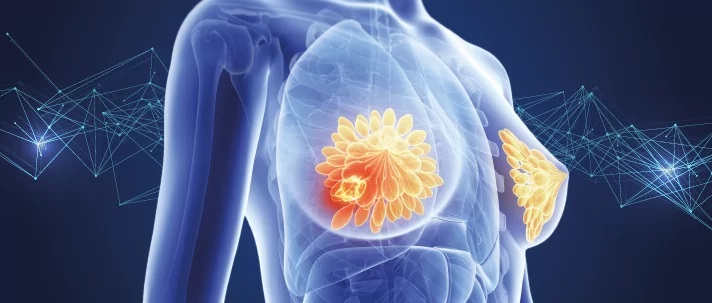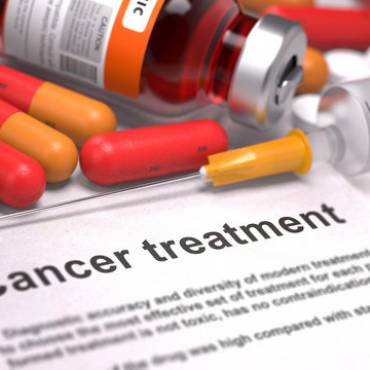Cancer cells have lost the normal regulatory mechanisms that help to control cell growth and multiplication. They lost their ability to differentiate. There are two types of malignant cells; benign cells stay in the same place, whereas malignant cells are developed to invade new tissues, ultimately causing secondary malignant growth from a primary location of cancer (metastasis).
Chemicals causing cancer are called mutagens. Cancer can be developed by chemicals, lifestyle (smoking, drinking), and viruses. Decades ago, the advent of chemotherapy, which involves cancer medications, provided clinicians with a therapeutic option in combination with radiation therapy for treating cancer patients. There has been much progress in the pharmacological treatment of cancer, including understanding the hormone dependence of normal and cancer cells, the development of chemotherapy after surgery, and using combination chemotherapy.
The most effective and commonly used cancer treatment is chemotherapy. Today more than five hundred medications for cancer are approved by the Food and Drug Administration (FDA). Most of these are categorized under three main classes of medications – immunotherapy, chemotherapy, and targeted therapy that work against cancer in different ways.
Chemotherapy to attack cancer cells
Chemotherapy drugs destroy cancer cells by stopping them from multiplying. If the cells can’t grow and multiply, they ultimately die. Some chemotherapy medicines function during a specific stage of the cell cycle. One of the reasons chemotherapies are given in treatment cycles is to deliver medicines when they are the most effective. Treatment periods are often alternated with rest periods to allow your body time to get stronger before the next cycle of chemotherapy.
Like most cancer cells, chemotherapy medicines attack cells that grow and multiply rapidly. Some normal cells, such as blood cells and cells in the hair follicles and lining of the digestive tract, also multiply rapidly and are attacked. The effect on these normal cells may contribute to numerous adverse effects commonly associated with chemotherapy. The adverse side effects include nausea, diarrhoea, vomiting, hair loss, and blood cell counts that contribute to an increased risk of infection, fatigue and bleeding.
Here are some common chemotherapy drugs:
- Alkylating agents – Procarbazine, carboplatin, cisplatin, busulfan, and carmustine
- Topoisomerase inhibitors – Topotecan, irinotecan, and amsacrine
- Plant Alkaloids – Docetaxel, paclitaxel, irinotecan, etoposide, and vincristine
- Antitumor antibodies – mitomycin, doxorubicin, bleomycin and idarubicin
- Antimetabolites – Gemcitabine, methotrexate, capecitabine, cytarabine, and 5-fluorouracil.
- Miscellaneous – Mitotane, bexarotene, hydroxyurea, estramustine, and tretinoin.
Side effects of anti-cancer medicines usually depend on the patient’s health before treatment, the type of cancer, and the type and dosages of the drugs. Chemotherapy can contribute to nausea, fatigue, diarrhoea, increased risk for bleeding and infection, mouth sores, taste changes, hair thinning or loss, and nerve and skin problems.
Immunotherapy create defence
Your immune system operates many organs and tissues of the lymphatic system and white blood cells (WBCs). Normally, the immune system attacks foreign invaders, including abnormal cells, but cancer cells can hide from the immune system, ignoring detection. Immunotherapy is a cancer treatment that involves drugs that go after the ability of cancer cells to hide from your immune system. Some immunotherapy medicines mark the cancer cells, assisting the defence system in recognizing and destroying them. Other immunotherapies enhance the immune system, allowing it to work better against cancer.
What are immune checkpoint inhibitors and monoclonal antibodies?
When the immune system identifies something harmful, it makes antibodies which are proteins that fight infection by adhering to antigens (molecules that start the immune response in your body).
Monoclonal antibodies are developed in the laboratory to enhance the body’s natural antibodies or function as antibodies. Monoclonal antibodies can be prescribed to block the activity of abnormal proteins in cancer cells. This can also be termed targeted therapy, a cancer treatment using medicines that target a specific gene of cancer, proteins, or tissue environment that supports the growth and survival of a tumour.
Examples of immune checkpoint inhibitors include avelumab, nivolumab, durvalumab, dostarlimab, atezolizumab, ipilimumab, nivolumab, etc.
Targeted therapy to block cancer cells
The class of medication targets the molecules that are key to the cancer cell’s ability to grow and spread. Where chemotherapy aims to destroy cancer cells directly, targeted therapies block cancer cells’ growth with less harm to normal cells. Most targeted therapies are monoclonal antibodies, which adhere to proteins inside the cancer cells.
Types of targeted therapies include Arimidex (Anastrozole), Trastuzumab, Imatinib, Bortezomib, Olaparib, and Avastin (Bevacizumab).
Cancer pills are part of the treatment for many patients to cure cancer. These help to relieve symptoms and improve the quality of life. If you have any questions regarding the use of cancer remission medications, please talk to your healthcare specialist.
Also Read: 5 Things You Can Do to Sleep Better During Cancer Treatment
admin
Latest posts by admin (see all)
- What is Triluma Cream? Uses, Benefits, and How It Works for Skin - December 26, 2024
- What Causes Dark Spots? Understanding the Science of Hyperpigmentation and How Skin Lightening Products Help - December 26, 2024
- Tretinoin Gel vs. Cream: Which Formulation is Right for Your Skin? - December 20, 2024



